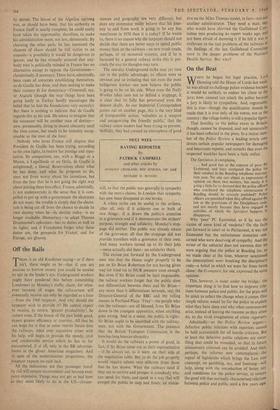On the Beat W HEN he began his legal practice, Lord
Denning told the House of Lords last wee, he was afraid to challenge police evidence because it would be unlikely to endear his client to the jury; now, counsel can attack the police because a jury is likely to sympathise. And, regrettablY, this is true—though the qualification should be made that it is true only of the towns, not in the country: the village bobby is still a popular figure. That hostility to the police exists in Britain. though, cannot be disputed, and not unnaturally it has been reflected in the press. In a recent num ber of the Police Review a leading article con- demns certain popular newspapers for damaging and inaccurate reports, and remarks that even the respected weeklies have been a little unfair.
The Spectator, it complains, . • . had good fun at the expense of poor PC Eastmond, and later castigated the police for their conduct in the Reading telephone interceP' lion case. No one can object to expressions of opinion on these two matters, but surely it is going a little far to demand that the police officers who overheard the telephone conversation at Reading should be severely punished? Police officers are punished when they offend against the law or the provisions of the Disciplinary code. and not merely because they have engaged ill activities of which the Spectator happens to disapprove.
Why 'poor' PC Eastmond, as if he was the victim of some kind of vendetta? On the facts put forward in court or in Parliament, it was not Eastmond but the unfortunate motorists con' cerned who were deserving of sympathy. And the writer of the editorial does not mention that we were arguing that the police at Reading (or, as we made clear at the time, whoeVer sanctioned the interception) were breaking the disciplinary code—a belief in which we were far from being alone : the Econqmi At for one, expressed the same opinion.
This, however, is water under the bridge: the important thing is to find how to improve rela- tions between police and public, for the press will be quick to reflect the change when it comes. One simple reform would be for the police to explain what they have done and why when controversies arise, instead of leaving the reasons, as they often do, to the vivid imagination of crime reporters.
Admittedly—as the Police Review argues-- defective public relations with reporters cannot be held accountable for all hostile criticism. But at least the defective public relations are some- thing that could be remedied, so that in future unnecessary criticism can be avoided. And then, perhaps, the reforms now contemplated—the repeal of legislation which brings the Law into contempt, on gambling, say, and licensing—will help, along with the introduction of better paY and conditions for the police service, to restore the good will that normally characterised relations between police and public until a few years ago.










































 Previous page
Previous page